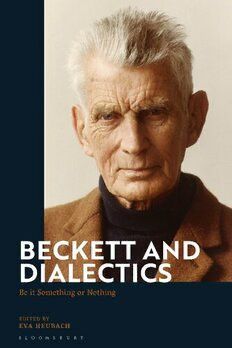
Beckett and Dialectics: Be it Something or Nothing PDF
209 Pages·2021·7.425 MB·English
Most books are stored in the elastic cloud where traffic is expensive. For this reason, we have a limit on daily download.
Preview Beckett and Dialectics: Be it Something or Nothing
Description:
For a long time, analysis of the work of Samuel Beckett has been dominated by existentialist and post-structuralist interpretations. This new volume instead raises the question of how to understand Beckett via the dialectics underpinning his work. The different chapters explore how Beckett exposes and challenges essential dialectical concepts such as objectivity, subjectivity, exteriority, interiority, immanence, transcendence, and most crucially: negativity.With contributions from prominent scholars such as Alain Badiou, Mladen Dolar, and Rebecca Comay, Beckett and Dialectics not only sheds new light on how Beckett investigates the shapes, types, and forms of negation – as in the all-pervasive figures of ‘nothing’, ‘no’, ‘null’, and ‘not’ – but also examines how several phenomena that occur throughout Beckett’s work are structured in their use of negativity. These include the relationships between voice and silence, space and void, movement and stasis, the finite and the infinite and repetition and transformation.This original analysis lends an important new perspective to Beckett studies, and even more fundamentally, to dialectics itself.
See more
The list of books you might like
Most books are stored in the elastic cloud where traffic is expensive. For this reason, we have a limit on daily download.
